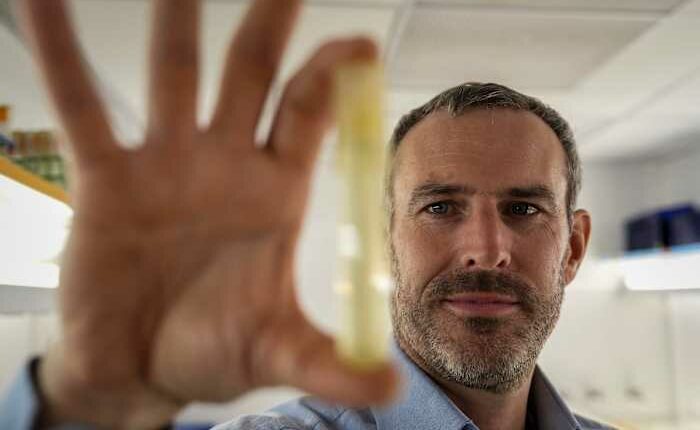Share this @internewscast.com

SEATTLE – Scientists long believed that Prochlorococcus, the tiniest and most abundant phytoplankton species on Earth, would flourish in a warmer climate. However, recent research indicates that as ocean temperatures rise, this microscopic bacterium, crucial to the marine food web and climate regulation, will experience a significant decline.
A study released Monday in the journal Nature Microbiology reveals that Prochlorococcus populations could diminish by up to 50% in tropical oceans within the next 75 years if surface temperatures climb above 82 degrees Fahrenheit (27.8 Celsius). Many tropical and subtropical sea temperatures are already above average and are likely to frequently exceed 86 degrees Fahrenheit (30 Celsius) during this period.
“These are pivotal species — extremely significant,” stated François Ribalet, a research associate professor at the University of Washington’s School of Oceanography and the principal author of the study. “When such a key species dwindles in number, it inevitably affects ecology and biodiversity. The food web will undergo changes.”
These tiny organisms hold a vital role in ocean life
Prochlorococcus are found in up to 75% of the sunlit ocean and contribute about one-fifth of the Earth’s oxygen through photosynthesis. More importantly, Ribalet noted, they transform sunlight and carbon dioxide into nutrients at the core of the marine ecosystem.
“In the tropical ocean, nearly half of the food is produced by Prochlorococcus,” he said. “Hundreds of species rely on these guys.”
While other phytoplankton varieties might replace some oxygen and food sources, Ribalet warned they aren’t perfect replacements. “Evolution has crafted this precise interaction,” he remarked. “This will undoubtedly disrupt the uniquely established system.”
The new results dispute long-standing beliefs that Prochlorococcus would thrive as seawaters heated. Those forecasts, however, were based on limited lab-cultured data. For this research, Ribalet and his colleagues analyzed water samples while navigating across the Pacific over ten years.
Over 100 research cruises — the equivalent of six trips around the globe — they counted some 800 billion individual cells taken from samples at every kilometer. In his lab at the University of Washington, Ribalet demonstrated the SeaFlow, a box filled with tubes, wires and a piercing blue laser. The custom-built device continuously pulls in seawater, which allowed the team to count the microbes in real time. “We have counted more Prochlorococcus than there are stars in the Milky Way,” Ribalet said.
Experts warn of ‘big consequences’
Paul Berube, a research scientist at Massachusetts Institute of Technology who studies Prochlorococcus but was not involved in the work, said the breadth of data is “groundbreaking.” And he said the results fit with what is known about the microbe’s streamlined genome, which makes it less adaptable to rapid environmental changes.
“They’re at the very base of the food web, and they feed everything else — the fish eat the things that eat the phytoplankton and we eat the fish,” he said. “When changes are being made to the planet that influence these particular organisms that are essentially feeding us, that’s going to have big consequences.”
To test whether Prochlorococcus might evolve to withstand hotter conditions, Ribalet’s team modeled a hypothetical heat-tolerant strain but found that even those would “not be enough to fully resist the warmest temperature if greenhouse emissions keep rising,” Ribalet said.
He stressed that the study’s projections are conservative and don’t account for the impacts of plastic pollution or other ecological stressors. “We actually tried to put forth the best-case scenario,” Ribalet said. “In reality, things may be worse.”
Steven Biller, an associate professor at Wellesley College, said the projected declines are “scary but plausible.” He noted Prochlorococcus form part of the “invisible forests” of the ocean — tiny organisms most people never think about, but are essential to human survival.
“Half of all photosynthesis is happening in the oceans and Prochlorococcus is a really important part of that,” Biller said. “The magnitude of the potential impact is kind of striking.”
Biller, Berube and Ribalet said that while other microbes may compensate somewhat, the broader risks to biodiversity and fisheries are real.
“We know what drives global warming. There is no debate among the scientific community,” Ribalet said. “We need to curb greenhouse gas emissions.”
He hopes the findings bring more attention to tropical oceans, which could serve as natural laboratories for warming adaptations and as early warning signals for ecological collapse.
“For the first time, I want to be wrong. I would love to be wrong,” he said. “But these are data-driven results.”
___
Follow Annika Hammerschlag on Instagram @ahammergram.
___
The Associated Press receives support from the Walton Family Foundation for coverage of water and environmental policy. The AP is solely responsible for all content. For all of AP’s environmental coverage, visit https://apnews.com/hub/climate-and-environment
Copyright 2025 The Associated Press. All rights reserved. This material may not be published, broadcast, rewritten or redistributed without permission.












